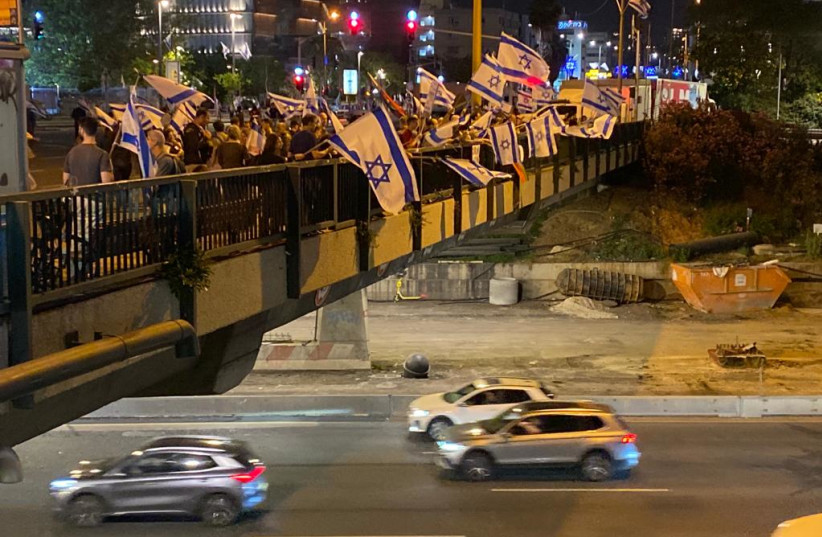Hundreds of thousands Israelis resume judicial reform protests for 18th straight week
Protests against the government’s proposed judicial reforms continued on Saturday evening for the 18th week in succession, with activists calling on the opposition to finalize or cease negotiations with the coalition.
“The time has come for decisions,” protest organizers said of the ongoing talks at the President’s Residence in a statement on Friday night. “We demand that opposition leader [Yair] Lapid and MK [Benny] Gantz come together to make a decision in the coming week, and if not, to end the negotiations. It’s either judges whipped into submission or democracy.”
Calling the government’s bluff
At Saturday’s protests, a banner with the faces of Prime Minister Benjamin Netanyahu, Justice Minister Yariv Levin, and Religious Zionist Party MK Simcha Rothman was superimposed on playing cards that said to “Call their bluff.”
Gantz said on Saturday at a protest in Netanya that if there was no progress toward a solution, he would reevaluate the negotiations.
“Our goal at the President’s Residence is not to be satisfied with talking,” said National Unity head Gantz.
 Protests against the judicial reform in Tel Aviv, May 6, 2023. (credit: AVSHALOM SASSONI/MAARIV)
Protests against the judicial reform in Tel Aviv, May 6, 2023. (credit: AVSHALOM SASSONI/MAARIV)Protest leaders said that the coalition saw the negotiation as a delay tactic so that they could pass a budget. The activists pointed to the right-wing pro-reform demonstrations, saying that they indicated that their opponents saw no room for agreement.
Lapid acknowledged these concerns at a Saturday demonstration in Rehovot, warning that the coalition could not hold talks “and at the same time discredit the judges of the High Court of Justice and send bullies into the streets.”
“We will turn over every stone to see if there is a chance to reach a historic agreement that will accompany us a hundred years into the future, but we will not let them just bide their time to save their government,” said Lapid.
With negotiations set to continue on Tuesday, activists called for an agreement on the matter of the Judicial Selection Committee, the most contentious of the reform provisions. Kan reported on Saturday that the Yesh Atid party would seek to discuss the panel, as consensus would come easier on the other items.
Former Hatnuah leader and current protest leader Tzipi Livni said in a Saturday speech that opposition leaders could only come to an agreement with the coalition if they agreed to accept the independence of judges.
Yesh Atid was also reported by Kan to be seeking to bring deliberations on the Conscription Law to the President’s Residence. The current law is set to expire on July 31, and in the coalition agreement, the government is supposed to resolve the issue of the Haredi draft before passing a budget. The government requested will reportedly seek a five-month delay on the law.
Protest leaders claimed on Friday that Thursday’s “day of disruption” protests removed the passing of a new conscription law from the government’s agenda. The campaign was launched as a “day of equality” against the reform and lowering the exemptions for haredim from IDF service.
Livni warned that “if we blink even for a moment they will take advantage of the opportunity. Blink and the draft evasion law will pass.”
The former Hatnuah leader also demanded the passing of a Basic Law that would enshrine Israel’s Deceleration of Independence into a law. This was a longtime proposal of Lapid and was brought up in his speech prior to the commencement of negotiations.
Protest leaders also warned on Friday that legislation was still technically on the table in the Knesset, and could quickly be passed.
“The sword of the dictatorship has not been removed when the legislation is prepared and waiting to turn Israel into a messianic and dangerous dictatorship,” said the activists. “
Lapid said at Saturday’s protest that “The government needs to remove all laws from the Knesset table and they need to understand — there will be no situation in which the coalition chooses judges for itself.”
Over 150 demonstrations across Israel
Demonstrations were said by organizers to have been planned in over 150 locations across Israel.
The central demonstration took place in Tel Aviv, where hundreds of thousands of protesters gathered on Kaplan interchange. The Tel Aviv demonstration was headlined by speakers such as Livni and Shikma Bressler, one of the leading protest organizers.
The Kaplan interchange, along with key roads inside Tel Aviv, was closed at 4:30 p.m. by Israel Police in preparation for the protests. The entrance and exit to Ayalon Highway were closed from the Kaplan interchange, out of concern that protesters would once again attempt to block the highway.
In Haifa, demonstrators marched from the Carmel neighborhood to Horev, leading to the central demonstration in Horev later in the evening.
Roads were blocked off by police in the nearby area throughout the evening.
The protests included roadblocks, marches and artistic displays in dozens of locations throughout the country. The activities continued throughout the day, including a significant wave in the morning and another in the afternoon and evening. Four protesters were arrested, three in Haifa and one at Hakfar Hayarok.
“This is a test for us,” Livni said in her speech. “And also for politicians in the President’s Residence.”





Comments are closed.